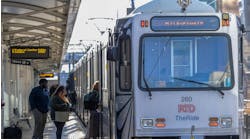Transit Means Jobs in Northern Virginia
“If Northern Virginia is going to be able to effectively compete for non-government related, private-sector business development, it must have a state-of-the-art, effective, financially sustainable, and efficient multimodal public transit system.” That is the conclusion of a new study by the Center for Regional Analysis at George Mason University. The report, released May 8 at a transit forum sponsored by the Northern Virginia Transportation Commission (NVTC), demonstrates the impacts that the regional transit network has had on the economy of Northern Virginia in terms of supporting population and economic growth, and contributing to improved land-use planning and the attendant impacts of taxable property values and enhanced quality of life in the region.
“Today, transit connects more businesses to workers, consumers and investors than ever before. Proximity to transit, which many Northern Virginia companies now use as a recruiting tool, is a plus for firms looking to attract a more qualified workforce, workers seeking new opportunities, and communities seeking to strengthen their tax base,” said David F. Snyder, NVTC chairman. “This research documents the growing importance of high capacity, high quality transit to our region’s economy.”
“It is the availability of transit services that permit individual households to choose a variety of lifestyle and housing cost options across the region, while maintaining access to regional job opportunities,” noted the report. “Businesses are increasingly conscious of the role that transit plays in attracting highly skilled workers. Increasing the effective labor shed of employees through transit services enhances market efficiencies for employers while simultaneously boosting job opportunities for residents. This allows businesses to better compete in regional, national, and international markets.”
More than half of all jobs in Northern Virginia are within a quarter-mile of a transit facility, according to a new, cooperative study by NVTC and Virginia Polytechnic Institute and State University. The analysis, which includes the 12 jurisdictions represented by NVTC and the Potomac and Rappahannock Transportation Commission, details the importance of proximity to transit based on job characteristics such as age, income, education and industry, and provides data for the number of transit-accessible jobs by transit system.
The Virginia Tech/NVTC research shows the greatest variation in transit-accessible jobs based on income. Sixty-two percent of the highest paying jobs – those where pay exceeded $3,333 per month – were within a quarter-mile of a transit facility, whereas 53 percent of jobs paying between $1,251-$3,333 and 54 percent of jobs paying $1,250 or less per month had the same proximity. Employee age produced the least variation, with the number of transit-accessible jobs holding steady at 58 percent for workers age 29 or younger, 30-54 and 55 or older. Public administration had the greatest percentage of transit-accessible jobs, at 75 percent, with management and professional, scientific and technical services at 71 and 68 percent, respectively.
The NVTC forum also highlighted nine local businesses that value transit. Cvent, for example, left a corporate campus in McLean for office space near Metro‘s Greensboro Station after an internal study found that a majority of its 645 employees lived in transit-accessible locales. The company, which plans to grow its workforce by 500, is leveraging the appeal of the Silver Line service and nearby urban amenities in its employee recruitment and retention strategies. In Old Town, restauranteur Jody Manor incorporates the area’s transit-rich environment into his employee recruitment and retention strategy for the Bittersweet Catering, Café and Bakery and the Waterfront Market and Café. Roughly 60 percent of Manor’s workforce commutes via transit. A free trolley, which runs every 15 minutes between the King Street Metro Station and the Potomac River, provides tourists and workers easy access to the restaurants.
“Being globally competitive requires a world-class transportation system,” said Snyder. “If businesses in Northern Virginia are to thrive, they will need greater access to the amenities that employees and customers want and that transit can provide. Businesses leaders and elected and appointed officials from all levels of government must continue to work in tandem to help the region develop the premier transit network needed to fuel economic growth.”


